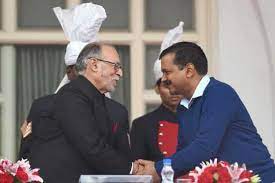Capital stalemate : On the conflict between the Chief Minister and Lieutenant Governor in Delhi
Governance is the casualty in the conflict between CM and LG in Delhi
The victory of the Aam Aadmi Party in the recent Municipal Corporation of Delhi (MCD) elections has added a fresh backdrop to the unceasing face-off between the Lieutenant Governor of the National Capital Territory and the elected government. Several Governors, who are all too eager to further the Bharatiya Janata Party’s politics, confront elected Chief Ministers from Opposition parties, but Delhi’s case is unique, given the vast executive-power at the command of the Lieutenant Governor. The most recent flashpoint between Chief Minister Arvind Kejriwal and Lieutenant Governor Vinai Kumar Saxena came ahead of the January 6 election of the Mayor and Deputy Mayor of the MCD, when Mr. Saxena appointed 10 aldermen and a BJP councillor to preside over the polls. The AAP alleged that Mr. Saxena had bypassed the tradition of appointing the senior-most councillor as the presiding officer. It has alleged that the aldermen appointed by Mr. Saxena were given voting rights in violation of the MCD Act, a question that remains unclarified. The party has pointed out that the Lieutenant Governor is ignoring the Council of Ministers and issuing orders to the bureaucracy directly on all matters, regardless of the division of power established by the Supreme Court between the two entities.
Technically, the Lieutenant Governor has executive control over only the three reserved subjects of police, public order and land; all other subjects (transferred subjects) lie with the elected government. But by virtue of being in control of the bureaucracy, and exercising the power to transfer, suspend or take any action against any employee of the Delhi government, the Lieutenant Governor’s authority extends beyond those. As its earlier interventions have not settled the dispute between the Lieutenant Governor and the elected government, the Supreme Court is currently examining the question afresh. Meanwhile, the relations between the Chief Minister and the Lieutenant Governor are sliding further. The Lieutenant Governor sought a meeting with the Chief Minister, but then refused to give him time. Till October, the Lieutenant Governor and the Chief Minister used to have weekly meetings. The Supreme Court’s calls for statesmanship and wisdom by actors have not resolved the stalemate, which is seriously impacting governance in the national capital. The heightened political competition between the AAP and the BJP has worsened the situation, but the root of it all is the legal ambiguity that needs to be dispelled.
